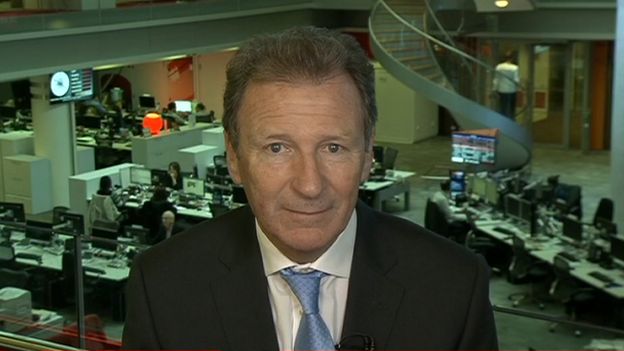Grandee casts doubt over electoral system
- Published

There are only seven days to go in this election.
I'm not going to trouble you with any more of my predictions for the actual result - there are plenty of people playing that game already.
But is it already possible to consider how we will look back at this election once it is all said and done?
The man who used to be charge of the Civil Service, Lord Gus O'Donnell, who was so instrumental in putting together the coalition in 2010 thinks it is, and that there are two very significant shifts that makes this election very significant, and potentially very messy.
Interestingly, his observations apply, whoever ends up in Number 10.
Talking to me for Newsnight, Lord O'Donnell was clear: the probable significant success of the SNP will "put extra tension" on the union between Scotland and the rest of the UK, and the union will be "subject to strains".
Sir Gus O'Donnell:
Cabinet Secretary, the highest office in the Civil Service, from 2005 to 2011 under Tony Blair, Gordon Brown and David Cameron.
On stepping down the post was split into three separate positions.
1989-1990: Press Secretary for the Chancellor
1990-1994: Press Secretary to the Prime Minister
2002-2005: Permanent Secretary of the Treasury
2012: Created a life peer as Baron O'Donnell, of Clapham
Also held director level positions at the International Monetary Fund, the World Bank, the Government Economics Service
The SNP of course say, time and time again, that this election is not about independence.
This old Whitehall hand, however, believes their likely transition to the third biggest party at Westminster will put new pressure on the UK as an entity.
'Legitimacy issues'
But he also believes, as the share of the votes of the mainstream parties declines, and we move to a multi party system, the incoming government may face "legitimacy issues" because there will be "unparalleled divergence between votes cast and seats received".
Lord O'Donnell, a cross bench peer said: "It looks likely the Conservatives will win England, the SNP will win in Scotland, and we will end up, quite possibly with Ed Miliband and Labour running the UK.
"People will think at the end of this, are there better systems? On 8 May, is this relationship between votes and seats so out of kilter that we should think again about it?"
Although the public overwhelmingly rejected a move to an alternative vote system, Lord O'Donnell suggests the voting system is not fit for purpose.
The irony of course, is that over the course of the last Parliament, the public have been consulted on whether it was time to end the union, and whether the voting system need to change.
In both cases, voters chose the status quo.
But will the likely messy outcome of next week's ballot cause people to think again?
- Published24 February 2014
- Published15 January 2014